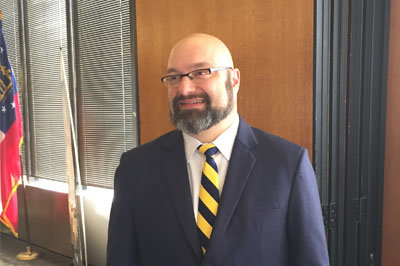 Truett McConnell University President Emir Caner was the featured speaker at the second Pastors Day at the Georgia State Capitol. GERALD HARRIS/Index
Truett McConnell University President Emir Caner was the featured speaker at the second Pastors Day at the Georgia State Capitol. GERALD HARRIS/IndexATLANTA — The response to last year’s Pastors Day at the Capitol was so positive the decision was made to host two Pastors Days this year. The purpose of the meeting was to help pastors know why they should be engaged in the process of state government and how to make an impact in governmental affairs.
Mike Griffin, Georgia Baptist Mission Board representative at the Gold Dome, facilitated the meetings this year and Dr. Emir Caner was the keynote speaker Wednesday, Feb. 9. Caner, president of Truett McConnell University and Anabaptist scholar, spoke on the subject “Religious Liberty: The Doctrine Built on the Blood of the Saints.”
The TMU president emphatically stated, “Throughout our history, believers were designated with various identities such as cannibals and atheists in the Early Church, anarchists and heretics in the Middle Ages, false teachers and simpletons in Modern Times, and now, under the guise of Postmodernism, simply extremists and bigots. While the terminology has changed over the centuries, little else has.
“However, perhaps no other doctrine has confounded the critics more than religious liberty, the belief that ‘God alone is Lord of the conscience,’ that believers will render unto Caesar what is Caesars but will, as well, stand against the state when such spiritual ends are ‘contrary to the revealed will of God.”
Caner continued, “Over recent years, we’ve explained our values and beliefs countless times to innumerable people of influence – but to no avail. We have been told repeatedly that our theology cannot get in the way of a new world, a progressive society developing so quickly into a Leftist Utopia that it has little room for those whose deeply held religious beliefs contradict the new philosophy of secular statists.
“The Scripture is, in one word, antiquated, and needs to be reinterpreted through the hermeneutical lens of liberalism. Scripture can no longer be the judge of man; man is now the judge of Scripture.
“Listening to politicians, theologians, and media bloviate over this New World, it dawned on me that few one the other side of the aisle have any idea how deeply cherished our belief in religious liberty is, and how deeply historical our fight for religious liberty goes.
“Deep inside the heart of dedicated believers beats an appreciation for twenty centuries of struggle against those who would silence our faith, those who demand we conform to whatever society is in vogue, those who persecuted such a great cloud of witnesses. We stand on the shoulder of giants, men and women of great faith, who, according to Scripture, ‘should not be made perfect apart from us’ (Hebrews 11:40).
“These voices,” Caner declared, “long since silenced, still speak today through the faithful witness of a new generation. Our generation must recognize that nearly 60 generations of Christians lived in an unfriendly world largely unwelcoming to liberty, religious, or political. But 240 years ago a nation was formed under a Judeo-Christian ethic, principles founded and given not by man, but by our Creator.
“Our first freedom was religion, that no man could be the lord of our soul or the king of our conscience. This freedom was not a mere toleration, but a liberty to both believe and to exercise our deeply held beliefs without substantial burden from our government.”
Caner recounted the history of those who have been persecuted for their faith and cited martyrs through the ages who died because they would not compromise their faith or their commitment to eternal truth.
The TMU president concluded his remarks with the following powerful and salient points:
President Caner’s case for religious liberty is clearly supported by God’s Word, Christian history, the example of the martyrs and by his own unwavering, steadfast faith.